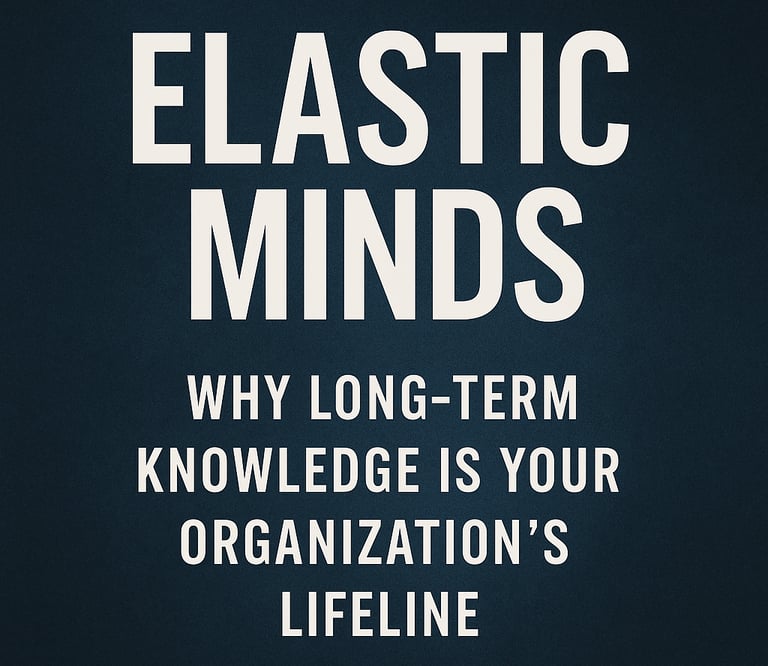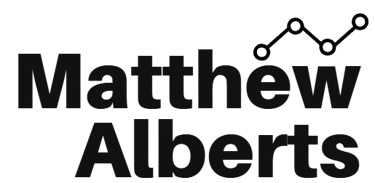Elastic Minds: Why Long-Term Knowledge Is Your Organization’s Lifeline
Across industries, a quiet crisis is unfolding, not of technology or headcount, but of knowledge application. As tenure collapses and turnover accelerates, we're losing something vital: the elastic minds capable of flexing experience across chaos, change, and complexity. Stored knowledge isn’t applied knowledge. AI can summarize a policy. A seasoned professional knows when to bend it without breaking it. In this follow-up to Michael Carroll ’s The Silent Collapse, I explore how the loss of tenure is silently fracturing our resilience across healthcare, education, energy, and beyond, and why adaptive wisdom, not just innovation, is the foundation of future-proof organizations.
Matthew Alberts, Ph.D.
5/19/20253 min read


Across industries today, leaders are waking up to a quiet crisis, Michael Carroll described as “the decay of knowledge application” fueled by the collapse of long-term tenure. In his essay The Silent Collapse, Carroll argued that when experienced people leave faster than wisdom can form, organizations lose their “elastic minds”: adaptive thinkers who know how to flex knowledge to meet changing realities.
This follow-up dives deeper into that insight. The evidence is clear: the erosion of tenure isn’t just a workforce issue, it’s undermining our capacity to respond, recover, and reinvent in real time. Without elastic minds as critical infrastructure, even the best data or AI won’t save us.
The Cost of High Turnover in Long-Cycle Sectors
In complex industries like healthcare, education, energy, and manufacturing, tenure isn’t just tradition, it’s a survival mechanism.
In U.S. hospitals, 20% of nurses plan to retire this year, while over a quarter of the current workforce expects to leave within 12 months. Employers are facing a “shortage of expert nurses,” not just any nurses. Veteran clinicians carry clinical judgment and contextual “deep smarts” that newer staff take years to build.
In education, nearly half of new teachers leave within five years. That’s not just a morale issue, it’s a measurable academic and financial hit. School districts spend over $2 billion annually replacing those who quit, and student outcomes suffer.
And in the energy sector, as many as 400,000 workers will retire in the next decade, taking with them not just technical skills, but the tacit know-how and adaptive strategies that don’t appear in any manual.
Why Elasticity Matters
“Elastic minds” professionals who can flex their understanding in real time don’t emerge from textbooks or LMS platforms. They’re forged over years of exposure to evolving conditions, repeated trials, and reflection on both success and failure.
Veteran nurses know when a patient’s condition is deteriorating before the vitals do. Experienced teachers sense when a lesson plan needs to shift mid-class. Skilled engineers don’t panic when a procedure fails, they adjust on the fly.
These professionals have learned that application is not repetition; it’s adjustment. That’s the true power of tenure: it makes people not just knowledgeable, but adaptively wise.
What Manuals and AI Can't Do
Organizations often try to replace lost experience with more systems: more documentation, more automation, more dashboards. But complex systems don’t break in expected ways. And when they do, what matters isn’t what’s written down, it’s who can interpret the unwritten.
Stored knowledge is not applied knowledge. And automation handles routine decisions, not the edge cases where judgment, intuition, and context come into play.
What’s missing? Tacit knowledge. The kind of “deep smarts” that can’t be explained in a bullet list but can change the outcome of a crisis. And the only way to acquire it? Tenure + exposure.
Who’s Getting It Right?
Some organizations are learning this lesson and acting before it’s too late.
Major employers like Cigna and Grant Thornton have developed programs to retain older employees as mentors, creating cross-generational knowledge continuity.
In Texas, a move to ban tenure in public universities was reversed after backlash, recognizing tenure’s role in academic excellence and institutional memory.
Many companies are bringing retirees back in part-time advisory roles, valuing their insight and cultural fluency over quick fixes.
These aren’t legacy perks, they’re strategic moves to retain adaptive capacity.
The Invisible Cost to the Next Generation
Ironically, the tenure crisis also affects those it’s supposedly benefiting younger professionals.
With fewer mentors and faster churn, early-career employees lose the chance to develop depth. They may gain breadth by job-hopping, but sacrifice the wisdom that comes only from sticking through a full cycle success, failure, iteration.
Mentorship, once a natural byproduct of long tenures, is now a rare privilege. Yet it's crucial. Without it, young professionals risk learning facts without learning flex.
What Needs to Change
To preserve resilience, we must revalue tenure, not as seniority for its own sake, but as the forge of flexible intelligence.
For organizations:
Build structured mentorship and knowledge transfer programs.
Create long-term career paths that reward adaptation, not just speed.
Rethink retirement: make space for phased exits, advisory roles, and alumni knowledge networks.
For individuals:
Don’t just chase exposure, seek cycles. Stay long enough to see how knowledge breaks and reforms.
Look for mentors. And when you gain experience, be one.
The future will not belong to organizations with the most data. It will belong to those with the most elastic minds, professionals who know how to bend, not break, when reality changes.
Sources
U.S. Bureau of Labor Statistics. Employee Tenure Summary (2024).
Deloitte. 2024 Global Gen Z and Millennial Survey.
APQC. Knowledge Loss: The High Cost of Turnover (2019).
Ingersoll, R. (University of Pennsylvania). Teacher Turnover and Student Achievement (2012).
Center for Energy Workforce Development. CEWD Workforce Survey (2023).
Ward-Perkins, B. The Fall of Rome and the End of Civilization. Oxford University Press. (2006)
Eichengreen, B. Golden Fetters: The Gold Standard and the Great Depression. Oxford University Press. (2000)
